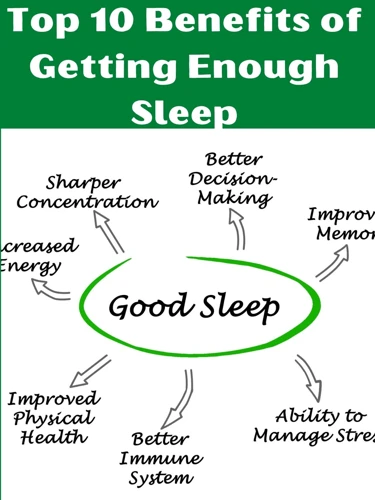It’s no secret that getting enough sleep is essential for our overall well-being, but did you know that it’s also crucial for weight loss and reducing cravings? The link between sleep and weight has been a topic of research for years, and the findings are surprising. Lack of sleep can affect hunger hormones, store fat, and lead to increased calorie intake and sugar cravings. In this article, we’ll explore the science behind this link and provide practical tips for how to get a good night’s sleep and manage hunger and cravings. So, let’s dive in and uncover the secrets of sleep and weight loss.
The Science behind Sleep and Weight Loss

Understanding the intricate relationship between sleep and weight loss is crucial for anyone trying to maintain a healthy weight. Research has shown that sleep plays a critical role in regulating hormones that determine our appetite and metabolism. By ignoring the importance of adequate sleep, we risk disrupting our body’s internal functions and sabotaging our efforts to lose weight. Let’s dive deeper into the science behind how sleep affects weight loss and what steps we can take to ensure we get the optimal amount of rest each night.
The Effect of Sleep on Hunger Hormones
Getting enough sleep doesn’t just help with physical and mental health, it also plays a crucial role in maintaining a healthy weight. One of the ways in which sleep affects weight loss is by regulating the hormones that control appetite and hunger.
Leptin is a hormone produced by fat cells that signals to the brain when you are full, helping to control your appetite. Sleep deprivation can reduce leptin levels, sending the body into starvation mode and causing you to crave high-calorie, high-carbohydrate foods.
Ghrelin, on the other hand, is a hormone produced in the stomach that triggers hunger signals in the brain. When you are sleep deprived, your ghrelin levels increase, making you feel hungrier than usual and encouraging you to eat more.
A lack of sleep also leads to an increase in cortisol, which is a hormone that the body produces in response to stress. High levels of cortisol can cause you to feel more hungry than usual and can lead to increased cravings for sugary, high-fat foods.
All of these hormone fluctuations can impact your calorie intake and ultimately affect your weight loss goals. So, it’s critical to prioritize getting enough sleep, in addition to maintaining a healthy diet and regular exercise routine.
| Hormone | Function | Effect of Sleep Deprivation |
|---|---|---|
| Leptin | Signals fullness and controls appetite | Decreased levels, causing cravings for high-calorie, high-carbohydrate foods |
| Ghrelin | Triggers hunger signals in the brain | Increased levels, making you feel hungrier than usual and encouraging you to eat more |
| Cortisol | Produced in response to stress | Increased levels, leading to increased hunger and cravings for sugary, high-fat foods |
The Effect of Sleep on Storing Fat
Research studies have found that inadequate sleep can impact weight gain and obesity, which is partly due to its effect on storing fat. Lack of sleep can disrupt the regulation of hormones that control the body’s metabolism and appetite, leading to increased fat storage. Let’s look at the details of how sleep affects fat storage in the table below:
| Lack of Sleep | Normal Sleep | |
|---|---|---|
| Hormone Levels | Increases levels of ghrelin, which stimulates appetite and slows metabolism | Maintains normal levels of ghrelin and metabolism-regulating hormones |
| Insulin Resistance | Increases resistance to insulin, leading to higher levels of blood sugar and increased fat storage | Maintains normal insulin sensitivity, preventing excess storage of fat |
| Adipose Tissue Activity | Increases activity in adipose tissue, leading to higher levels of fat storage | Maintains normal adipose tissue activity to prevent excess fat storage |
As shown in the table, inadequate sleep increases levels of the hormone ghrelin, which stimulates appetite and slows metabolism. This leads to overeating and decreased energy expenditure, which can cause weight gain and increased fat storage. Lack of sleep also causes insulin resistance, which leads to higher levels of blood sugar and increased storage of fat. Adequate sleep maintains normal insulin sensitivity, preventing excess storage of fat. Inadequate sleep also increases activity in adipose tissue, leading to higher levels of fat storage. Adequate sleep maintains normal adipose tissue activity to prevent excess fat storage.
How Sleep Affects Hunger and Cravings

As if trying to lose weight wasn’t already difficult enough, lack of sleep can make it even harder. Sleep plays a crucial role in regulating hunger and controlling cravings, both of which are significant factors in weight management. When we don’t get enough sleep, our bodies experience hormonal changes that can lead to increased appetite and weight gain. Poor sleep quality is linked to other unhealthy dietary behaviors such as snacking and sugar intake. In this section, we will explore the science behind how sleep affects hunger and cravings, and offer some strategies to help keep both under control.
Sleep Deprivation and Increased Calorie Intake
Sleep deprivation can lead to increased calorie intake, which can contribute to weight gain. Research has found that individuals who slept less than 7 hours a night were more likely to consume high-calorie, high-fat foods than those who got adequate sleep. Here are some reasons why this might happen:
- Increased appetite: Lack of sleep can disrupt the balance of hunger hormones in the body, leading to an increase in appetite and cravings for unhealthy foods.
- Lowered self-control: Sleep-deprived individuals may have reduced self-control, making it harder to resist unhealthy food cravings and impulses.
- More time awake: With less sleep, there are simply more hours in the day to consume food, leading to a higher total calorie intake.
It’s important to address sleep deprivation as a potential contributor to weight gain and take steps to improve sleep habits. In addition to getting adequate sleep, including foods that promote relaxation and sleep, such as those high in magnesium or melatonin, can also be helpful in combating the negative effects of sleep deprivation on weight management.
The Link Between Sleep and Sugar Cravings
Studies have shown that lack of sleep can trigger an increase in sugar cravings. When we don’t get enough sleep, our body’s glucose metabolism is affected, leading to an increased desire for foods that are high in sugar and simple carbohydrates. This happens because sleep deprivation can cause hormonal imbalances, which can disrupt the body’s ability to regulate blood sugar levels.
In fact, a study published in the journal Sleep found that individuals who slept less than five hours a night were more likely to consume sweet, starchy and high-fat foods than those who slept for 7-8 hours a night. Another study conducted by the University of California, Berkeley found that sleep-deprived individuals chose snack foods with twice the amount of fat as those who were well rested.
Sleep deprivation can lead to an increase in the hormone ghrelin, which stimulates hunger, and a decrease in the hormone leptin, which suppresses appetite. This imbalance in hormones can cause us to feel more hungry and crave unhealthy foods, especially those high in sugar and carbohydrates.
To break the cycle of sugar cravings caused by lack of sleep, it’s important to focus on improving the quality and quantity of sleep we get each night. It’s also important to implement healthy eating habits to avoid being tempted by high-sugar snacks throughout the day.
Consuming a balanced diet that includes fruits, vegetables, whole grains, and lean protein can help control blood sugar and reduce the desire for sugary foods. Additionally, staying hydrated and managing stress levels through techniques like meditation or deep breathing can also help reduce sugar cravings.
The link between sleep and sugar cravings is clear, and it highlights the importance of prioritizing sleep to maintain a healthy diet and reduce cravings for unhealthy foods.
How to Get a Good Night’s Sleep

Getting enough sleep is essential for our body’s overall wellbeing, but it can also play a significant role in maintaining a healthy weight and reducing cravings. However, achieving quality sleep can often feel like a challenge. With conflicting information and busy schedules, it can be challenging to know where to start. But don’t worry! By making a few simple changes to your habits and environment, you can set yourself up for a good night’s rest. Let’s take a closer look at some practical tips for improving your sleep hygiene.
Establish a Sleep Routine
Creating a consistent sleep routine is one of the most effective ways to improve your sleep quality. A regular sleep routine will help regulate your body’s internal clock, making it easier to fall asleep and wake up feeling rested. Here are some tips to help you establish a good sleep routine:
| Tip | Description |
|---|---|
| Set a Consistent Bedtime | Try to go to bed at the same time every night, even on weekends. This will help regulate your body’s internal clock, making it easier to fall asleep and wake up at the same time every day. |
| Establish a Nighttime Routine | Create a relaxing bedtime routine that you can follow every night. This could include taking a warm bath, reading a book or listening to calming music. |
| Avoid Stimulating Activities Before Bed | Avoid activities that can stimulate your mind or body before bed, such as using electronics, exercising, or consuming caffeine or alcohol. |
| Limit Daytime Napping | Limit daytime napping to 30 minutes or less, and avoid napping too close to bedtime, as this can disrupt your sleep at night. |
| Create a Sleep-Friendly Environment | Make your bedroom a comfortable and relaxing environment that promotes sleep. This could include keeping the room cool, dark and quiet, and investing in a comfortable mattress and pillows. |
By following these tips, you can create a consistent sleep routine that will help improve the quality and duration of your sleep. Remember, it may take some time for your body to adjust to the new routine, so be patient and stick with it.
Avoid Stimulating Substances
It’s important to avoid stimulating substances in the hours leading up to bedtime to ensure a good night’s sleep. Here are some substances to be aware of and avoid if possible:
- Caffeine: This stimulant can interfere with your ability to fall asleep and stay asleep. It’s best to avoid caffeine in the afternoon and evening.
- Nicotine: Nicotine is a stimulant that can cause sleep disruptions. Quitting smoking can greatly improve the quality of your sleep.
- Alcohol: While alcohol can initially help you fall asleep, it can disrupt your sleep later in the night and lead to poor sleep quality.
- Sugar: Consuming sugar before bed can lead to a rise in blood sugar levels, which can interfere with falling and staying asleep.
By avoiding these stimulating substances, you can create a sleep-conducive environment and promote a better night’s rest.
Limit Exposure to Screens
When it comes to getting a good night’s sleep, it’s important to limit exposure to screens. This includes TVs, smartphones, tablets, and computers. The blue light emitted by these devices can suppress the production of melatonin, the hormone that regulates sleep. This, in turn, can disrupt your natural sleep cycles and make it more difficult to fall and stay asleep.
So how can you limit your exposure to screens?
One way is to establish a “screen curfew” for yourself. This means avoiding the use of screens for at least an hour before bedtime. You could also try using a blue light filter on your devices or investing in blue light blocking glasses, which can help reduce the negative impact of screen time on your sleep.
Another important step is to avoid using screens in the bedroom altogether. Using devices in bed can create unhealthy associations between your sleeping environment and stimulating activities, making it more difficult to fall asleep when you actually want to. Instead, try winding down with a book or a relaxation technique like meditation or gentle stretching.
The following table summarizes some helpful tips for limiting your exposure to screens:
| Tips for Limiting Exposure to Screens |
|---|
| Avoid screens for at least an hour before bed |
| Use a blue light filter on devices or blue light blocking glasses |
| Avoid using devices in the bedroom |
| Read or practice relaxation techniques instead of using screens before bed |
By limiting your exposure to screens, you can help ensure that you get the restful, restorative sleep necessary for weight loss and overall health.
Make Your Environment Sleep-Conducive
Creating a sleep-conducive environment is essential for getting a good night’s sleep. Here are some tips to make your bedroom more suitable for sleeping:
| Tip | Description |
| Temperature control | Keep the temperature between 60-67°F (15-19°C) to promote sleep. |
| Darkness | Use heavy curtains or blinds to block out any light that can interfere with sleep. |
| Quietness | If your bedroom is noisy, try using earplugs or a white noise machine to block out any disruptive sounds. |
| Comfortable bed | Make sure your mattress and pillows are comfortable and supportive to avoid any discomfort and allow for a good night’s sleep. |
| Declutter | A cluttered bedroom can cause unnecessary stress that can prevent you from sleeping. Keep your bedroom clean and tidy. |
| Reduce electronics | Keep the number of electronic devices in your bedroom to a minimum or remove them entirely as they can emit bright light and disturb the circadian rhythm that regulates sleep. |
By creating a sleep-conducive environment, you can promote a good night’s sleep, which can help with weight loss and reducing cravings.
Other Ways to Manage Hunger and Cravings
As important as getting enough sleep is in managing hunger and cravings, there are other steps you can take to support your weight loss goals. From eating a balanced diet to exercising regularly, there are a variety of strategies you can use to curb cravings and stay on track with your weight loss journey. In this section, we’ll explore some of these additional techniques and how they can benefit your overall health and wellness.
Eat a Balanced Diet
A balanced diet is crucial not only for maintaining overall health but also for managing hunger and cravings. When we eat a balanced diet, our bodies receive the necessary nutrients to function properly, and we are less likely to experience cravings and overeat. Here are some tips for incorporating a balanced diet into your daily routine:
- Include a variety of foods: Eating a diverse range of foods ensures that we are getting all essential nutrients. Include a mix of fruits, vegetables, whole grains, lean proteins, and healthy fats in your meals.
- Avoid processed foods: Processed and highly refined foods often contain added sugars and unhealthy fats that can contribute to cravings and weight gain. Opt for whole, unprocessed foods whenever possible.
- Eat mindfully: Practicing mindful eating means paying attention to hunger cues and stopping when you’re full. This can help prevent overeating and promote a healthy relationship with food.
- Don’t skip meals: Skipping meals can lead to an increase in hunger and cravings later on. Make sure to eat regularly throughout the day to keep your energy levels and metabolism up.
By incorporating these tips into your diet, you can not only manage hunger and cravings but also improve your overall health and well-being. Remember, a balanced diet is just one aspect of a healthy lifestyle that includes regular exercise, stress management, and good sleep habits.
Stay Hydrated
Drinking enough water throughout the day is essential for overall health, but it can also be beneficial in managing hunger and cravings. When the body is dehydrated, it may mistake thirst for hunger, leading to unnecessary snacking.
To ensure adequate hydration, it is recommended to drink at least 8 glasses of water per day. Additionally, incorporating hydrating foods into your meals, such as fruits and vegetables with high water content, can also contribute to your water intake.
Other benefits of staying hydrated include:
- Improved metabolism
- Reduced water retention
- Enhanced physical performance
- Better digestion
However, it’s important to note that simply drinking more water won’t necessarily lead to weight loss. It’s important to also maintain a healthy and balanced diet, as well as incorporate physical activity into your daily routine.
Staying hydrated is not only important for overall health, but can also aid in managing hunger and cravings. By drinking enough water and eating hydrating foods, you can maintain adequate hydration and potentially reduce unnecessary snacking.
Manage Stress
Stress is one of the major causes of weight gain and can seriously impact your sleep schedule. To manage stress levels, you can try the following strategies:
- Practice Mindfulness: Mindfulness is a technique that helps you stay present in the moment and lets you focus on your thoughts and feelings. By practicing mindfulness regularly, you can reduce stress levels and increase your sense of well-being.
- Try Meditation: Meditation is a powerful tool that helps you manage stress and reduce anxiety levels. By meditating regularly, you can calm your mind and relax your body, which can help you sleep better.
- Get Active: Exercise is an effective way to reduce stress levels and improve mood. Even moderate exercise, like going for a walk or doing yoga, can help reduce stress levels and improve sleep quality.
- Take Time for Self-Care: Make time for activities that you enjoy and that help you de-stress, like taking a bubble bath or reading a book.
- Seek Support: Don’t be afraid to reach out to friends, family, or a therapist for support. Talking to someone can help you manage stress levels and reduce anxiety levels.
By managing stress levels effectively and adopting healthy habits, you can improve your sleep quality and reduce cravings, ultimately leading to better weight management.
Exercise Regularly
Regular exercise is not only beneficial for improving overall health and fitness, but it can also help with weight loss and reducing cravings. According to research, exercise can help regulate appetite hormones and decrease the desire for unhealthy food choices.
The Effect of Exercise on Appetite Hormones
Exercise has been shown to increase the production of hormones like peptide YY (PYY) and glucagon-like peptide-1 (GLP-1), which help regulate appetite and reduce hunger. These hormones send signals to the brain to create a feeling of fullness and satisfaction, making it less likely to overeat.
On the other hand, exercise has also been shown to decrease the production of ghrelin, a hormone that stimulates hunger, especially for high-calorie, high-fat foods. By decreasing the levels of ghrelin, exercise can help reduce cravings and encourage healthier food choices.
Types of Exercise for Weight Loss and Cravings
When it comes to weight loss, any type of exercise that burns calories can be beneficial. This includes aerobic exercise like running or biking, strength training, and high-intensity interval training (HIIT). However, finding a type of exercise that is enjoyable is key to sticking with it long-term.
For reducing cravings, low-intensity exercise like walking or yoga can be effective. These types of exercises can help reduce stress levels and release feel-good endorphins, which can help reduce the likelihood of emotional eating.
Regardless of the type of exercise chosen, consistency and frequency are important for seeing results. Aim for at least 30 minutes of exercise most days of the week for maximum benefits.
Conclusion
Exercise is an important component of a healthy lifestyle, and can aid in weight loss and reducing cravings. By regulating appetite hormones and reducing cravings for unhealthy foods, exercise can help create a more sustainable and balanced approach to healthy eating. Incorporating regular exercise can have numerous benefits beyond weight loss and reducing cravings, including improved mood, increased energy levels, and decreased risk of chronic diseases.
Conclusion
In conclusion, it is clear that getting enough sleep is crucial for weight loss and reducing cravings. The science behind sleep and weight loss shows that sleep affects hunger hormones and the body’s ability to store fat, both of which can lead to weight gain if not properly regulated. Additionally, sleep deprivation has been linked to increased calorie intake and sugar cravings.
To ensure a good night’s sleep, it is important to establish a sleep routine, avoid stimulating substances before bedtime, limit exposure to screens, and make your environment conducive to sleep. These strategies, combined with eating a balanced diet, staying hydrated, managing stress, and exercising regularly, can help manage hunger and cravings and improve overall health and well-being.
It is essential to prioritize sleep as a fundamental pillar of a healthy lifestyle. Ignoring the importance of sleep can lead to a host of negative impacts, including weight gain, a weakened immune system and impaired cognitive function. By taking steps to optimize sleep habits and manage cravings, individuals can improve their quality of life and promote long-term health. Thus, it is strongly recommended to prioritize quality sleep for better health outcomes.
Frequently Asked Questions
What is the recommended amount of sleep for adults?
Most adults should aim for 7-9 hours of sleep per night.
Can lack of sleep make us gain weight?
Yes, sleep deprivation can lead to weight gain and difficulty losing weight.
Why does lack of sleep affect our hunger hormones?
Lack of sleep can cause our hunger hormones, ghrelin and leptin, to become imbalanced, leading to increased hunger and cravings.
How can poor sleep habits contribute to storing fat?
When we don’t get enough sleep, our bodies produce more of the stress hormone cortisol, which can lead to increased fat storage, particularly in the abdominal area.
Can poor sleep habits really affect our sugar cravings?
Yes, lack of sleep has been linked to increased cravings for sugary foods and drinks.
Why is a consistent sleep routine important for good sleep?
Establishing a consistent sleep routine helps regulate our body’s natural sleep-wake cycle and can improve the quality of our sleep.
What are some examples of stimulating substances to avoid before bedtime?
Caffeine, nicotine, and alcohol are all substances that can interfere with sleep.
Why is limiting screen time before bedtime important for good sleep?
The blue light emitted by screens can inhibit the production of the sleep hormone melatonin, making it harder to fall asleep and stay asleep.
What makes an environment sleep-conducive?
A cool, dark, and quiet environment can help promote good sleep.
Why is exercise important for managing hunger and cravings?
Exercise can help regulate our hunger hormones and improve our mood, reducing the likelihood of turning to food for comfort.







